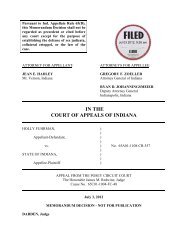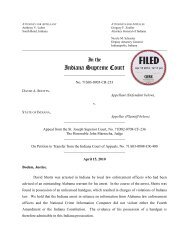Abby Allen and Walter Moore v. Clarian Health ... - State of Indiana
Abby Allen and Walter Moore v. Clarian Health ... - State of Indiana
Abby Allen and Walter Moore v. Clarian Health ... - State of Indiana
You also want an ePaper? Increase the reach of your titles
YUMPU automatically turns print PDFs into web optimized ePapers that Google loves.
easonable value is not necessarily represented by either the amount actually paid or the<br />
amount stated in the original medical bill. Id.<br />
<strong>Indiana</strong> law notwithst<strong>and</strong>ing, <strong>Clarian</strong> contends that the weight <strong>of</strong> foreign law<br />
shows, in effect, that hospitals are not held to the same reasonableness st<strong>and</strong>ard in the<br />
interpretation <strong>of</strong> their contracts for medical services. <strong>Clarian</strong> first cites a 2007 decision <strong>of</strong><br />
the Supreme Court <strong>of</strong> South Dakota. In that case, the court considered whether the<br />
plaintiffs stated a claim when they alleged that certain hospitals unreasonably charged<br />
them the “full, undiscounted cost rather than the discounted rates Hospitals charged<br />
insured <strong>and</strong> Medicare/Medicaid patients.” Nygaard v. Sioux Valley Hosps. & <strong>Health</strong><br />
Sys., 731 N.W.2d 184, 190 (S.D. 2007) (quotation omitted). The South Dakota Supreme<br />
Court held:<br />
we conclude that this theory fails to state a claim because the price terms<br />
were controlled by language in the contracts. The complaints all allege that<br />
the Hospitals required the Patients to sign contracts agreeing “to pay, in<br />
full, unspecified <strong>and</strong> undiscounted charges for medical care, which charges<br />
[were] pre-set by [the Hospitals] . . . .” (Emphasis added.) Because, as we<br />
explain below, pre-set price charges were pleaded, the price terms were<br />
fixed <strong>and</strong> determinable, <strong>and</strong> because the contracts spoke to the issue <strong>of</strong><br />
price, the law does not permit imputation <strong>of</strong> different, implied price terms<br />
for what patients later claimed were the reasonable values <strong>of</strong> the services<br />
provided<br />
Id. at 191 (some emphases added; alterations, <strong>and</strong> omission original). As the court<br />
further noted, “prices that are previously fixed at a given amount are determinable.<br />
Therefore . . . the contracts were not silent or open concerning price <strong>and</strong> we cannot<br />
impute commercially reasonable . . . terms into the agreements.” Id. at 191-92.<br />
<strong>Clarian</strong> also relies heavily on DiCarlo v. St. Mary Hospital, 530 F.3d 255 (3d Cir.<br />
2008). In DiCarlo, the United <strong>State</strong>s Court <strong>of</strong> Appeals for the Third Circuit adopted the<br />
10

















